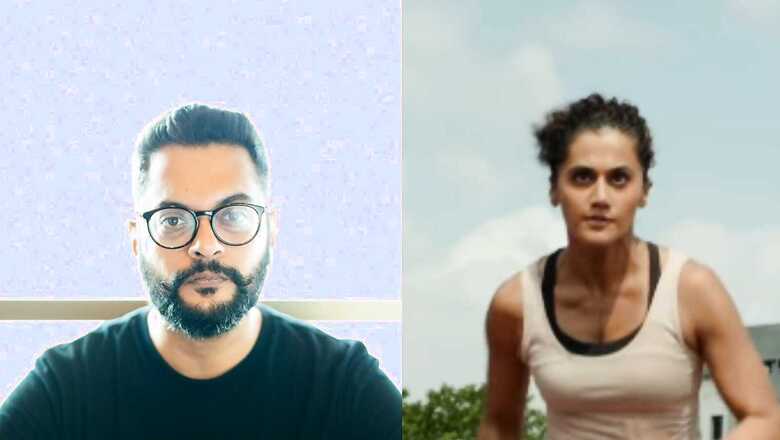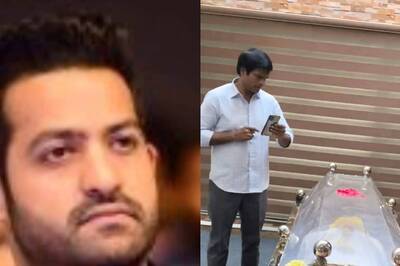
views
The subject of sports has always been among the favourite topics of our filmmakers, with them churning out hits year after year in this genre. And why shouldn’t it be? There isn’t an abundance of stories of athletes who leap over the highest of barriers to become our national heroes. However, taking a detour from the tales of struggle (which are equally important), director Akarsh Khurana has highlighted important, yet comparatively unknown issues through his upcoming film Rashmi Rocket – gender verification testing and hyperandrogenism.
Starring Taapsee Pannu, Abhishek Banerjee, Priyanshu Painyuli and Supriya Pathak, the film is an attempt to throw light on this orthodox practice that ends up exploiting female athletes. However, dealing with a sensitive issue such as this requires a responsible approach and has its own sets of challenges. To know more about what went behind representing the story on the screen accurately, we reached out to Rashmi Rocket’s screenplay writer Aniruddha Guha, who had forged a friendship with the director while reviewing his films a couple of years back.
Guha gave us a comprehensive account of how they moved through multiple genres and turned a complex issue into something that would be accessible to everyone. Excerpts from the interview:
Tell us about how and why you came on board?
Nanda Periyasamy (Tamil filmmaker) had written a story and pitched it to Taapsee. Akarsh and she met at a film festival and decided to collaborate on it. By the time I entered the picture, Akarsh had turned that story into a simple 9 pager, for the sake of brevity. All the elements were more or less there but I felt there was scope to turn things around, and he agreed. So I took a couple of months to work on it and came back with a 40-pages long detailed story/step outline that eventually turned into the screenplay of Rashmi Rocket.
I remember when Akarsh first narrated the idea to me, at one point he said the words ‘gender test’, and my immediate response was, “I’m doing this!” The prospect of writing a sports film, but also something never shown before in our cinema, was too good to resist.
Also Read: Priyanshu Painyuli on Playing an Army Officer in Rashmi Rocket: Wanted to Make My Father Proud
The film talks about a crucial issue. How hard was researching for it?
I had some idea of what gender testing and hyperandrogenism was even before I started writing the film, but as I began researching the subject, the hole kept getting deeper. I got Malay Desai, a journalist friend who’s also a sports enthusiast on board, and together we took a very clinical approach to the research. The public’s knowledge of gender testing is restricted to the major cases that make headlines, but it’s more common than you’d think. There have been several reports written by sports psychologists and doctors around the world that delve deep into the practice.
We had to get the research right at several levels. First, I wanted to get the athletics part of the story right. Then came the gender testing aspect, followed by the courtroom bits. We wanted to make sure every part of the story was represented correctly on screen.
Was it challenging to tell such a complex subject in a feature film format?
I want to be very unapologetic when I say this, and Akarsh and I joked about it all the time: we set out to make a mainstream film. Unfortunately, there’s some baggage attached to that word. And yet there are fine examples of movies over the past four, five years where a really solid story rooted in reality reached out to a wide audience.
An example of good storytelling within the mainstream format is Dangal. It had a superstar fronting it, and yet you see the craft, technique and smartness in its telling. It doesn’t matter if your film is about wrestling, cricket or athletics, you need to find a human connection, and make it palatable to audiences.
So, to answer the question, I didn’t see writing the film as a challenge at all. If anything, I was excited by the fact that we had to turn a slightly complex issue into something that would become accessible to everyone; and tell an important, novel story within the confines of a commercial Hindi film framework.
How did you balance out the seriousness of the film with the entertainment quotient?
The most important task for me was to get the structure right. It’s not just balancing a serious issue with entertainment per se, but also that the movie is straddling different genres. It’s as much a sports drama as it’s an issue-based film. And then it’s also a courtroom drama. Each of these genres come with specific trappings. The fun was in trying to find novelty even in that; to subvert genre tropes wherever possible.
So, how did you move away from those tropes while writing Rashmi Rocket?
A small example: the lawyer in our story is an underdog. It’s common to have larger-than-life actors like Sunny Deol (in Damini) and Amitabh Bachchan (in Pink) getting justice for the ‘victim’ in our films. This is why Abhishek Banerjee is such great casting because he’s an unassuming actor. Audiences are surprised to see him in the role because they associate him with characters like Hathoda Tyagi. His casting, in line with how the character was written, gives the story an edge.
Also Read: Abhishek Banerjee: My Mother Found Hathoda Tyagi in Paatal Lok Disgusting and Disrespectful
On the other hand, our protagonist Rashmi Vira isn’t an underdog at all. If anything, she’s an exceptionally talented, naturally gifted and brilliant athlete; there’s literally nothing that can stop her from achieving greatness. If only she’s allowed to run. That makes the central conflict more interesting. How can you clip the wings of a person who was born to fly?
How was watching Taapsee bring Rashmi’s character to life?
Usually, it’s writers who live with the film for the longest time, from ideation to writing to filming to post-production, right until the day of release. But in the case of Rashmi Rocket, Taapsee was present from day one. She knew the story inside out, and all her inputs were invaluable to the script. And when you have such a deep understanding of the story, it naturally reflects in your performance too.
Also Read: Taapsee Pannu Most Perfect Person to Play This Part, Says Rashmi Rocket Director Akarsh Khurana
Lastly, one can’t help but notice the similarities the trailer has with Dutee Chand’s story…
That might be because hers was one of the more well-known cases in India. Having said that, it’s slightly reductive to find the mention of a gender test in a film and assume that it’s based on a specific person, because there is so much more to that person than this one thing that took place in their life. Dutee is a national icon, and I hope to see her story on screen one day. However, Rashmi Rocket is not that story. Our film is a tribute to several sportswomen around the world who’ve had to undergo gender testing and bear the social and psychological ramifications that come attached with this archaic practice.
Read all the Latest News , Breaking News and IPL 2022 Live Updates here.



















Comments
0 comment